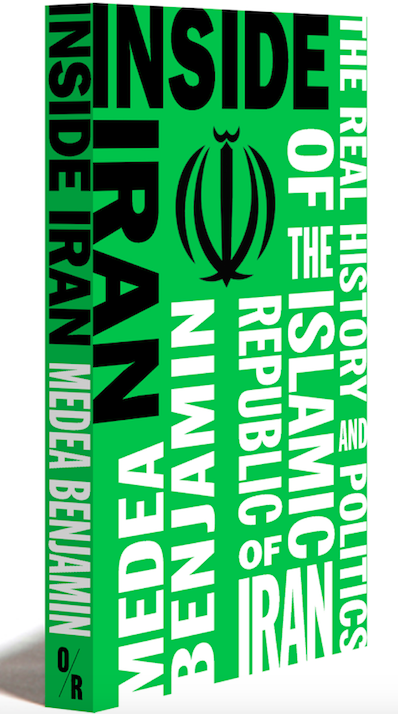Medea Benjamin’s entry into the public sphere came with disruptive vigor in May 2013, when she interrupted an address by former US President Barack Obama to object to his then policy on the use of armed drones.
Obama responded to Benjamin at the time saying, “The voice of that woman is worth paying attention to… these are tough issues, and the suggestion that we can gloss over them is wrong.”
The incident perhaps gave Benjamin a bigger audience for her activism via the organization CODEPINK, through which she had been involved for years. And through which she’s tackled a number of global issues across the world.
Having looked at the Kingdom of Saudi Arabia in a book published in 2016, she’s now taking on Iran.
The publisher, OR Books, writes:
“In 1979, the Iranian Revolution brought a Shia theocracy to the 80 million inhabitants of the Middle East’s second largest country. In the decades since, bitter relations have persisted between the U.S. and Iran. Yet how is it that Iran has become the primary target of American antagonism, when Saudi Arabia, a regime that is even more repressive, remains one of America’s closest allies?”
Benjamin’s book Inside Iran attempts to look at this complex relationship from a multitude of angles. From the pre-colonial period to the CIA-engineered coup that overthrew the country’s democratic leadership in 1953, and then its emergence as the one nation Democrats and Republicans alike regularly unite in denouncing. She tackles the contradictions in Iran’s system of government, its religiosity, and its citizens’ way of life.
So we understand more of Benjamin’s drive behind the book, she sat down and answered a few questions for The Iranian.
Medea, why did you feel it was the right time to produce a book about Iran and who did you want to target with it?
[US President] Donald Trump had been campaigning against the Iran deal, so I knew when he won that the Iran deal would be in trouble. I wrote the book and got it out quickly to help in the campaign to stop a new war with Iran.

Could you speak a little about the process of writing it and how you came up with a comprehensive overview on Iran.
I wanted to write a very basic book on Iran that was an overview of the history, how the government works, human rights, the situation of women, Iran’s relationship with its neighbors and with the West, and future prospects. I had recently written a basic book on Saudi Arabia (Kingdom of the Unjust: Behind the US-Saudi Connection) so I had somewhat of a template to use for the Iran book. I also had the benefit of several Iranian-American friends who were wonderful readers of the drafts, and friends inside Iran who answered many, many questions along the way.
Many of our readers are part of the Iranian diaspora in the US. What do you think they will be able to take away from the book?
Iranian friends in the diaspora have told me how useful it was to see an outside, distilled perspective, even on issues they are familiar with. I got many ‘I can’t believe I didn’t know that’ comments. I also think it’s a great book for Iranians to give to their non-Iranian friends to give them a taste of the deep, rich and complicated nature of Iran both past and present.
OR Books mentions that you touch on your own experiences with activists and politicians? Would you be able to speak of the kind of work you’ve done in Iran?
I worked very hard on getting US Senators to support the Iran deal in 2015 and I continue to work on getting congressional support. After watching in horror how the US invaded Iraq and the terrible consequences for the Iraqi people, I am determined to do everything I can to stop a similar situation in Iran. My trips to Iran have helped me show how sanctions only strengthen the hardliners and why moving towards full diplomatic and trade relations with Iran will help the democratic forces inside Iran.
What Iranian project through your career most sticks out for you?
As part of working to improve US-Iranian relations, I have traveled to Iran several times. One project that sticks out is one that I have not, so far, been able to accomplish. I was approached by a doctor in Iran who wanted me to help organize a team of Iranian and American doctors to travel somewhere together to provide medical services for people in either a very poor country or a country suffering from a terrible natural disaster. His idea was to show the world that Americans and Iranians could work together for the benefit of humanity, instead of fighting each other. I love the idea and would still love to do it.
Diplomatic relations between the US and Iran are at a new low with the recent announcement by US President Donald Trump – how do you see this reneging of the deal playing out?
I think we are in a very dangerous moment. It is not clear that the Europeans will be able to provide their companies with enough guarantees that they will not be affected by secondary US sanctions. If they can’t, the conservative forces in Iran will push for Iran to leave the deal, and then the US, or Israel, might retaliate. The future scenarios under this Administration do not look bright. Perhaps our best chance at peace with Iran is to elect a new congress and then, a new president.
Do you see this as part of a wider US strategy from the administration’s hawks? And what are your thoughts on how US foreign policy under Trump compares to that under Obama?
While under the Obama administration, the US was close to both Israel and Saudi Arabia, the US relationship with these countries has become even closer under Trump. Both Israel and Saudi Arabia opposed the Iran nuclear deal and fear any US rapprochement with Iran. Trump has also brought virulent anti-Iran hawks into the White House, particularly John Bolton as National Security Advisor. This is all creating the “perfect storm.”
Iran’s track record, as you point out in the book, isn’t perfect either. What do you think Iran needs to do to appease the US and what should other international players draw more of a hardline on?
There are domestic openings that need to happen, not to appease the US but to respond to the legitimate demands of the Iranian people for a more open, democratic society. Civil associations should be allowed to flourish, no one should “vet” who can run for office, the power of the Supreme Leader needs to be curtailed, there should be an end to the death penalty, women should have equal rights (including the right to dress as they please). But the Trump administration is not concerned about human rights (look at its friendship with Saudi Arabia, which is more authoritarian than Iran).
The US is concerned about Iran’s involvement in the region, from Syria to Yemen. It’s ironic that the US is complaining about Iran’s increased influence in the region when it was the US invasion of Iraq that gave Iran more clout by overthrowing a Sunni leader and installing Shia leaders. But the US can’t dictate Iran’s foreign policy. Instead of pressuring Iran, the US should be pushing for serious talks with all regional players. After all, there will be no end to the Middle East conflicts without Iran. The Trump administration has to get real about that and instead of fighting Iran, it should be working with Iran to stop the fighting that has consumed the region.
Could you tell The Iranian about any future projects and the next steps for you and CODEPINK.
We are planning to step up our advocacy work in several ways. We want to have more ongoing contact with women’s groups in Iran and help uplift their voices/concerns in the US. We also want to organize more direct ties between US and Iranians citizens. We are anxious to work with Iranians in the diaspora and would love to hear from folks. You can reach me at medea@codepink.org.
Inside Iran is available from OR Books.
The Iran Nuclear Deal is the best thing Barack Obama ever did in terms of foreign policy. Then came Donald Trump. An all-new book from internationally-known activist and author Medea Benjamin takes a look at the real politics and history of Iran—and its complex entanglement with American politics






